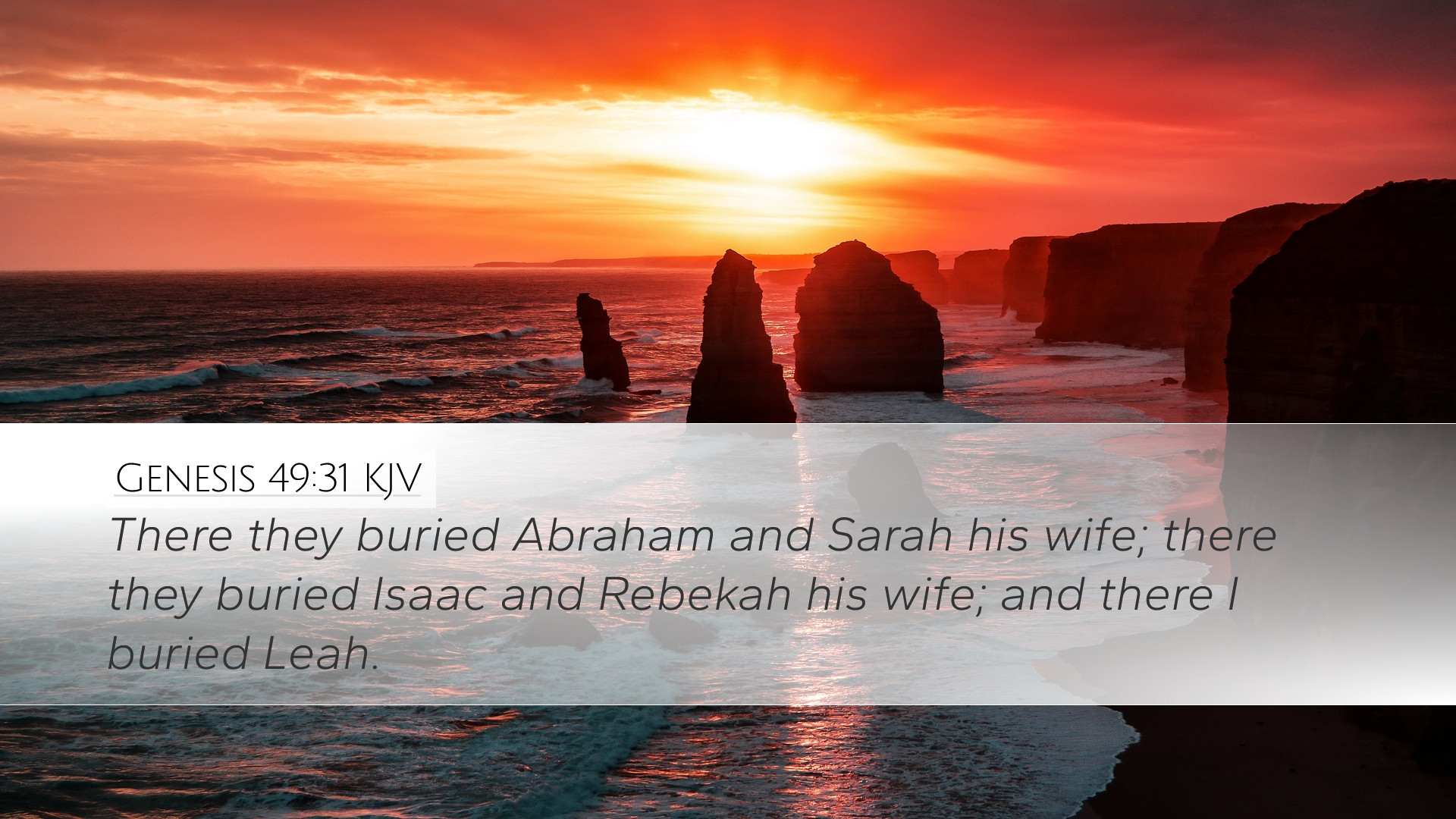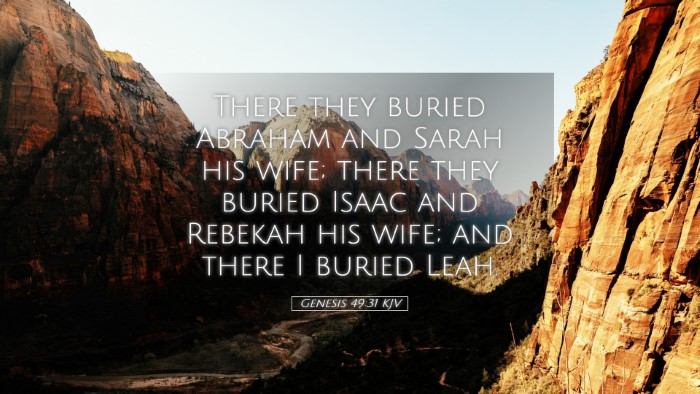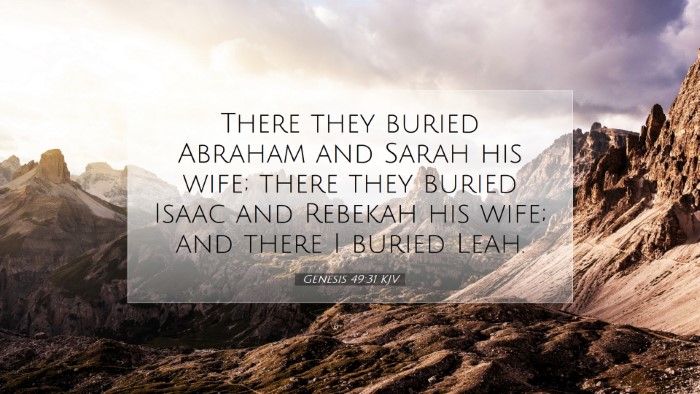Commentary on Genesis 49:31
Verse Text: "There they buried Abraham and Sarah his wife; there they buried Isaac and Rebekah his wife; and there I buried Leah."
Introduction
The closing chapters of Genesis hold profound significance, particularly as Jacob speaks his final words to his sons. Genesis 49:31 serves a dual purpose, both as a historical recount and a prophetic declaration of the future of Israel. In analyzing this verse, we will explore insights from prominent public domain commentaries, highlighting the theological and interpretive depth relevant for pastors, students, theologians, and biblical scholars.
The Historical Context
To fully comprehend the weight of Jacob's declaration in this verse, it is essential to revisit the historical context. Jacob’s life has been colored by a complex relationship with his family, marked by conflict, favoritism, and reconciliation. As he prepares to bless his sons and impart final words, he reflects upon the family history intertwined with the burial location.
Insights from Commentators
Matthew Henry's Commentary
Matthew Henry emphasizes the significance of the burial site at Machpelah, a cave purchased by Abraham. He notes that this site symbolizes not only the fulfillment of God's promises to Abraham regarding the land but also the continuity of God's covenant with Israel. Henry posits that the repeated emphasis on the patriarchs' burials here underscores the importance of lineage, faith, and the expectation of resurrection.
Albert Barnes' Notes
Albert Barnes provides a detailed exploration of the names included in the verse. He explains that the mention of Abraham, Sarah, Isaac, and Rebekah, followed by Leah, serves to establish the patriarchal lineage of Israel. Barnes interprets this as an affirmation of God’s covenant faithfulness, as each of these figures played a pivotal role in the unfolding narrative of redemption. He also points out the significance of Leah’s burial—in Jewish culture, the first wife had important status, which speaks to the complexities of family relationships and God’s sovereign choice in using imperfect families for divine purposes.
Adam Clarke's Commentary
Adam Clarke delves into the implications of burial practices in ancient Israelite culture. He highlights that burials are a critical part of legacy, signaling a return to the earth which is seen as sacred in biblical theology. Clarke further notes the emotional resonance inherent in Jacob's words; the act of mentioning Leah hints at his own reconciliation with her, despite earlier tensions. By reclaiming Leah’s role, Jacob portrays a public acknowledgment of her as part of the covenant community.
Thematic Considerations
- Covenant and Continuity: This verse is a poignant reminder of the covenant God made with Abraham, which extends through Isaac and Jacob. Each burial represents a fulfilled promise, reinforcing the notion that God’s plan is carried through generations.
- Legacy and Memory: Jacob’s affirmation of his family members’ resting place invokes reflections on the importance of lineage in the Israelite culture, where heritage is integral to identity and community.
- Divine Sovereignty: Throughout the biblical narrative, God uses familial relationships—often fraught with strife—to accomplish His purposes, showcasing His ability to weave complexities into His overarching plan.
Theological Implications
Reflecting on Genesis 49:31, several theological implications arise for modern readers. The text challenges pastors and theologians to consider how burial and remembrance relate to the larger narrative of redemption. Jacob’s mention of his ancestors exemplifies the Christian understanding of communion with saints, reinforcing the notion that the faithful are a part of a larger story that transcends time.
Resurrection and Hope
The reference to burial inevitably leads to reflections on death and resurrection—concepts central to Christian theology. Just as the patriarchs anticipated the fulfillment of God’s promises, New Testament believers cling to the hope of resurrection through Jesus Christ. This connection provides a rich ground for pastoral teaching and encourages believers to view death not as the end but as a transition to eternal life.
Family Dynamics and Grace
The complexities of Jacob's family demonstrate the intricacies of human relationships. While sin and strife marred their interactions, the overarching grace of God shines through. Pastors can draw on these themes to discuss forgiveness and reconciliation within families, emphasizing that God's grace is sufficient to heal even deep-seated wounds.
Conclusion
Genesis 49:31 encapsulates a rich tapestry woven with themes of legacy, covenant, and divine faithfulness. The reflections from public domain commentaries reveal layers of meaning that resonate with contemporary readers, particularly for those in pastoral and scholarly settings. Just as Jacob’s words serve to connect him with his ancestors and affirm the promises of God, so too do they invite us to consider our own place within God’s unfolding story of salvation.


